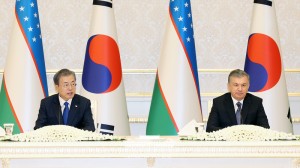 President Moon Jae-in paid an official visit to Central Asia from April 16 to 23. Summits were held in Turkmenistan, Uzbekistan, and Kazakhstan to bolster relations with these countries. This marked his first trip to the region since he took office in 2017.
President Moon Jae-in paid an official visit to Central Asia from April 16 to 23. Summits were held in Turkmenistan, Uzbekistan, and Kazakhstan to bolster relations with these countries. This marked his first trip to the region since he took office in 2017.
Strengthening relations with Central Asia has been a priority of Korean foreign policy since the early 1990s. Foreign policy concepts of various presidents, including Roh Moo-hyun, Lee Myung-bak, and Park Geun-hye, aimed to improve relations with Central Asia in the areas of economy and energy resources. President Moon’s New Northern Policy formulation is also emphasizing new prospects between Korea and Central Asia. Therefore, his visit was part of the sustainability of Korean foreign policy implementation in the post-Soviet area which has abundant resources and emerging markets. At this point, Moon’s visit was a crucial turning point in relations because it will lead to $28 billion worth of projects.
President Moon met with Gurbanguly Berdimuhamedov, the leader of Turkmenistan on his first stop. Korea has a big interest in the energy sector of this country and has realized many projects in three decades. Currently, Korean companies are operating in the petrochemical, transportation, and energy processing sectors. The leaders pointed out the importance of the Kiyanly Petrochemical Complex project which was completed in October 2018 by a consortium in which Korean Hyundai Engineering Co. took part. Additionally, Hyundai has sent hundreds of buses to Turkmenistan as a result of an earlier agreement. Memorandums of understanding were signed to expand cooperation on energy, transportation, economic and cultural areas. Finally, the establishment of the King Sejong Institute in Turkmenistan was also announced.
At his second destination, President Moon arrived in Uzbekistan and met Shavkat Mirziyoyev, the leader of the country. Uzbekistan is a key player of Korean policy towards Central Asia with its great potential for bilateral ties. Relations were established in 1992 and upgraded to a strategic partnership after 2006. Currently, over 600 Korean companies are operating in the country. Uzbekistan also became home to a large number of ethnic Koreans who were deported from Russia in 1937.
Both sides signed deals worth $12 billion during the visit. Currently, the trade volume is over than $2 billion. Therefore, President Mirziyoyev called Korea as a strategic partner. Also, President Moon reminded people of the deep historical relationship between Korean and Turkish civilizations in the region. In his speech, mentioning the contributions of Ibn Sina, Al Khwarizmi and Mirzo Ulugbek to the development of science in the world made this visit more valuable for the Uzbekistan side. On the final day, he visited the campus of Inha University in Tashkent to observe the cooperation of Korean and Uzbek medical teams.
On his final stop, he met with Kazakh President Kassym-Jomart Tokayev in Nur-Sultan, the capital of Kazakhstan. Both leaders underlined the joint preparation for the Fourth Industrial Revolution. Trade relations have grown 220-fold since 1992 and the volume reached $2.2 billion in 2018. Kazakhstan’s 2050 development strategy and Korea’s New Northern Policy have similar aims to boost relations in the region with middle- and long-term plans. In the current situation, both leaders desire to expand the relationship by creating new cooperation areas, calling this new step, ”Fresh Wind”. New technology initiatives, 5G, and newly established industrial areas are key terms of this new partnership period. Additionally, logistics and transportation are included as potential issues to strengthen relations if the Korean peninsula reaches peace. On the other side, Kazakhstan has become an important supporter of denuclearization for regional peace purposes.
Central Asia has great potential for Korean investment. Seoul has created a peaceful relationship with regional countries focusing only on the economic and energy sectors without involvement in domestic political issues. Thus, the New Northern Policy promises a win-win situation for all of the Eurasian region.
Mehmet Fatih Oztarsu
The Korea Times
http://www.koreatimes.co.kr/www/opinion/2019/04/162_268043.html

 Nisan 30th, 2019
Nisan 30th, 2019  oztarsu
oztarsu  Posted in
Posted in  Tags:
Tags: